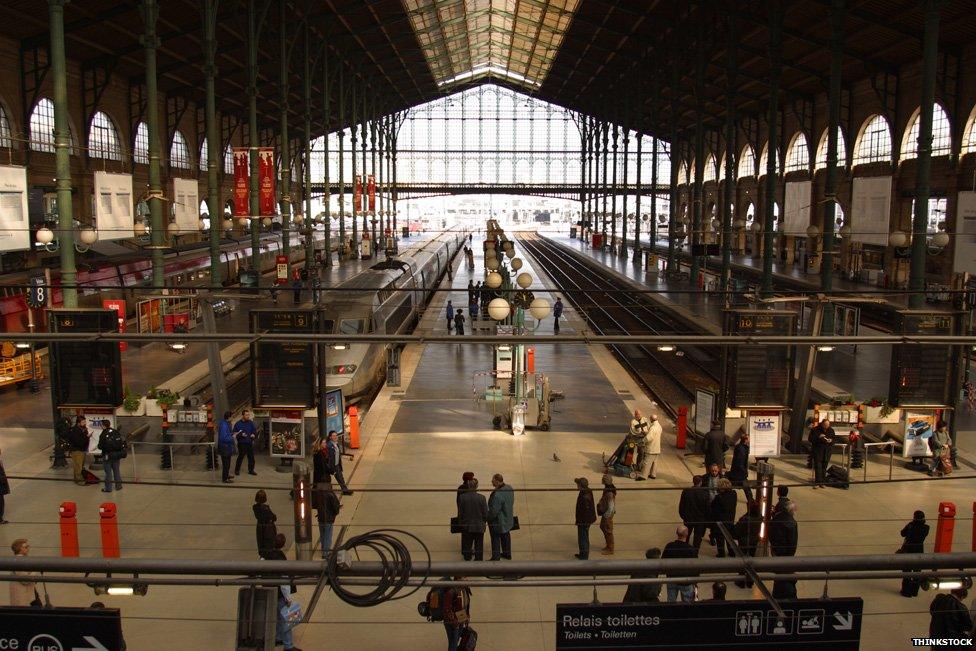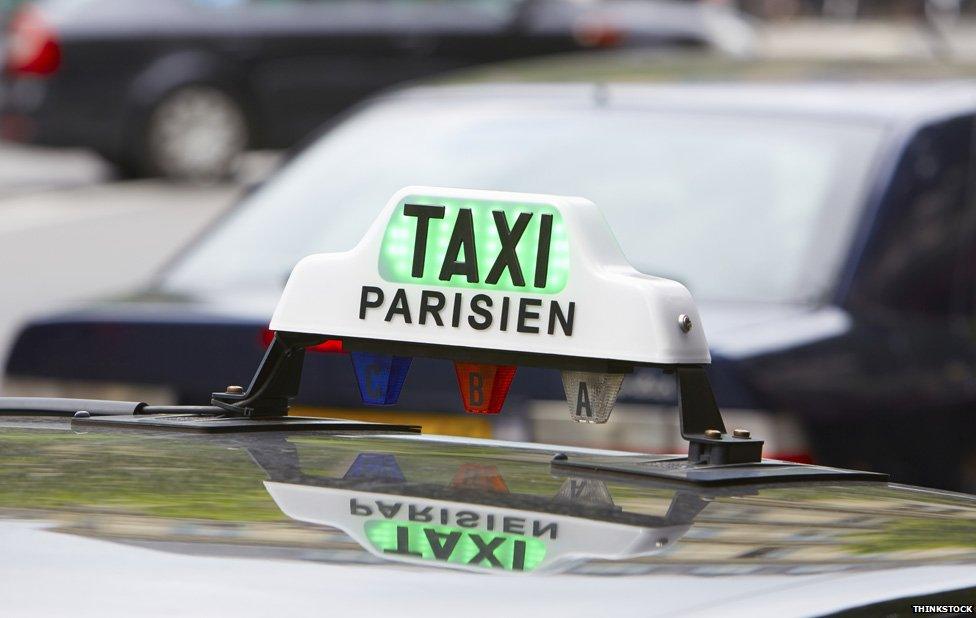A Point of View: Phoneless in Paris
- Published

The loss of a phone in Paris provides a moral lesson for Adam Gopnik - but not the one he was expecting.
Not long ago, I got to spend a couple of days in my favourite city of Paris, and while I was there I lost my iPhone. I wasn't sure exactly when, and I wasn't sure exactly how. We were staying at an old-fashioned hotel right across from the Gare du Nord, which is the great train station in the north of Paris where phones go to be stolen. It seems to have a kind of magnetic attraction for smartphones of all kinds - meaning, really, just that it's a locale for pickpockets who can, in effect, wangle a smartphone from your pants by sheer force of will from across the station floor.
We had gone to the Gare du Nord to find a taxi to take us out to Saint Denis for my work - a slightly grimy suburb of Paris that in its day was the cathedral seat of the French kings. All I knew was that by the time we got back to the hotel, I no longer had my phone. In the strange way of these things, I even had no memory of the last time I had held it. One of the oddities of our time is the phenomenon of the phantom phone - the certainty that you feel your smartphone vibrating in your pocket when, in fact, it isn't. So I could remember at various moments thinking that I had felt it vibrate, but couldn't be sure if it had, or if it was just my nerve endings filling an empty pocket.

All the odds suggested, though, that it vanished some time and place around the Gare du Nord - that a skilled pickpocket had taken it. I ran my head back through all of our encounters and intersections as we had searched for a cab, but I couldn't pick out the telltale pickpocketing moment. No one had asked me to sign a petition, nobody had brushed alongside me or accidentally spilled something on or near me, no child had tugged at me plaintively.
I knew the full catalogue of those distractions because only a year before I had come to Paris and the Gare du Nord to write a reporting piece about, as it happens, pickpocketing in Paris, external, a subject that, in Paris, often unfairly but inexorably, leads to the subject of the Roma in France - to the people we once called gypsies, and sometimes Romany or Roms. It was one of those pieces that well-meaning liberal writers write, thinking that they are exploring prejudice in order to defuse it. I had interviewed Romany activists, and leading Roma thinkers in and out of France - I could even tell you what symbol would have been on the Romany flag if one ever flew over a Romany nation (a wagon wheel).
The distinction that I was trying to make when I wrote up what I had seen, was that while it might well be true that the Roma had an engagement with pickpocketing, and you might often find Roma syndicates involved, this was still not at all the same thing as thinking that the problem of petty theft was ethnic. Just as the horrible stereotypes of Jews as grasping and greedy contribute to the hatred of Jews with all its horrible consequences - still, when Woody Allen, in his old cabaret act, held up a pocket watch and said: "You see this watch? On his deathbed, my grandfather sold me this watch," I not only laughed, but knew that, speaking from within his own culture, there was sufficient truth in the stereotype to earn a laugh. My own great aunt had asked me on her deathbed, exactly how much The New Yorker magazine actually paid me.
These questions of others and aliens was, as it happened, very much on my mind as I was also in France to attend a seminar about one of the great French Jewish philosophers of the 20th Century, Emmanuel Levinas, whose subject was how we deal with the Other - the big, philosophical Other, with a capital "O". His philosophy, which tends towards obscure articulation and gnomic utterance, is simple at heart - that we discover ourselves by looking at others. In place of the classic French inquiry that Descartes began - what can I know, what can I see, how do I know that I am at all? - everything I see and hear could be a dream or a delusion imprinted by a demon, or implanted in my head by a machine.

iPhone therefore I am: How would Rene Descartes have coped with Adam Gopnik's dilemma?
In place of that Levinas said if we look someone in the eye, sense her mind at work - that is when we feel alive ourselves. Tolerating other people is not the second thing we learn laboriously, it is the first thing we have to know in order to know that we are alive at all. He thought "Know thyself" was actually bad advice. "Look around!" is better. And yet I felt a certain kind of rueful self-mockery and shame, familiar to liberal journalists, when I realised that my phone had been sacrificed to the purity of my sentiments and the loftiness of my philosophical allusions. I had waltzed through the Gare du Nord, having persuaded myself to be imprudent, glorying in my encounter with the Other, and while I was so glorying, the Other had taken my phone.
Then on our last night in Paris, as we packed and talked to our hosts, an email arrived written in stilted but fluent English:
"Hello. I am actually the daughter of the taxi driver in Paris and we have found your phone between two seats in the taxicab. So how can we give your phone back? Chong Caroline."
I answered at once. We were leaving in the morning, and so we arranged for Monsieur Chong to meet us outside our friends' apartment just before our taxi came to take us to the airport. We should have left it at that, but then it occurred to all of us at once that it seemed rather pointless to arrange for a taxi driver to drop off a phone five minutes before a taxi driver arrived to take us to the airport, so we called back in a fit of inspiration and arranged with Mademoiselle Chong to have her father come round in the morning, pick us up, return the phone, accept his reward, and then conclude the merry occasion by driving us to the airport.
This negotiation took more time than perhaps this description suggests it should have, since it had to be worked out in trilingual form, with Mademoiselle Chong's fluent French and formal English being translated to her father in Mandarin.
It seemed thrilling. But of course it didn't work. We went down to wait for him - and we waited and waited, and when we finally reached him, on my wife's phone, discovered that he was indeed waiting for us - at the airport, where he had, virtuously, already gone. Trilingual negotiation had its limits, and he had thought we wanted a pick-up there.

So we found another taxi, and raced off.
And here is where the story becomes - I think - a bit special. Far from driving off in exasperation as he had very right to do - and as indeed he probably should have done to get his rush-hour business - Monsieur Chong, we discovered when we got to the airport, had actually circled the airport over and over, waiting for us to call again so that he could return the phone to us. His view of the other was so courteously humane that he circled the airport for two hours with the Other's phone. Searching for him among the lookalike taxis, (all the while I thought shamefully that I would not recognize his face) because I had in our perfectly courteous trip out to Saint Denis, never really looked at him. What had begun as a philosophy had now become a practical question of parking. Would I know the Other when I saw him, having failed to see him properly the first time?
We intersected at last, recognised each other - "Oh, yes, of course, you!" (even when we do not look we do see) - and with the plane about to leave, took my phone and thrust a small reward at him, which he refused to take. Then off he drove, and once again I had my photos and my screen saver and my notes and my music. What I had feared would be a story about the tragedies of immigration in France turned out to be one about its triumphs, albeit in a suitably muted tone - not about ethnicity at all but about M. Chong and his daughter. Or maybe a better way of putting it is that there are no tragedies, no triumphs - there are only individual cases, which may merge together into muddy patterns. At times they may even cluster in train stations - but are finally, ineffably singular. The Other comes to us only one by one, with a daughter with elaborate but imperfect high school English. There is no "Other" with a capital O. There are only others, circling the airport in a moment of dogged and unearned charity.
As soon as we got home off the plane from Paris, I told our children the story and was about to unload some moral lessons on them. But my wife cut me off before I could. "Dad's right," she said. "There is a life lesson. Always - always - look back at the seat when you leave a taxi." I couldn't argue with that.

A Point of View is broadcast on Fridays on Radio 4 at 20:50 BST and repeated Sundays 08:50 BST
Subscribe to the BBC News Magazine's email newsletter to get articles sent to your inbox.